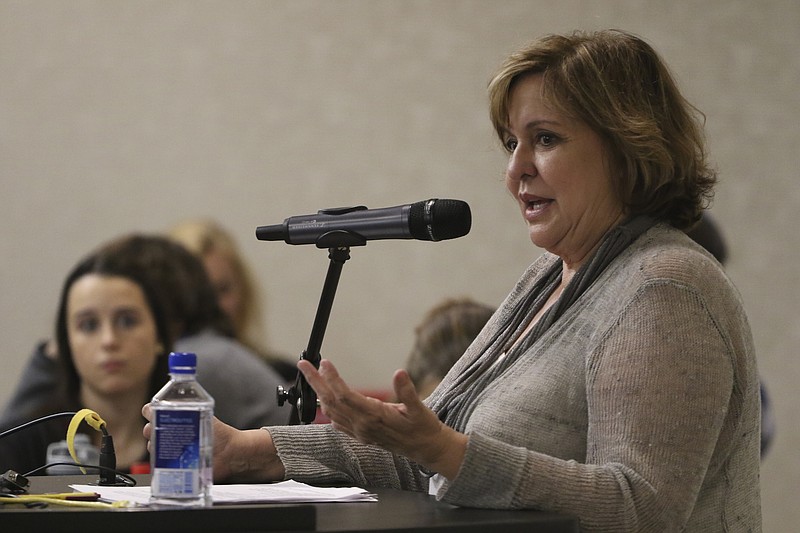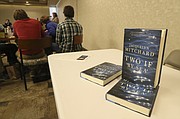Crossover authors
Authors who established careers in one genre before crossing into Young Adult fiction.› David Baldacci› John Grisham› Carl Hiaasen› Joyce Carol Oates› James Patterson› Salmon Rushdie
Jacquelyn Mitchard’s advice on writing
› Ask yourself: If someone forbid me to write, would I be depressed for awhile or heartbroken? How much does it mean to me?› Have the reputation for being a person who finishes what you start.› Give your story a title. Never turn a story in with a number or “untitled” in the title.› Make friends. You may be talented, but don’t be conceited. Don’t perceive anyone as less than you.› Have patience with yourself. This is a time when you should have mostly questions and fewer answers.› If you have nothing to write about, don’t blame writing, blame yourself. You’re not looking at the world hard enough.› Copy the people (writers) you admire. Copy their voices, but not their ideas or words.› Let life surprise you.
What would you do if a woman claiming to be Oprah Winfrey left a phone message stating she wanted to "start the largest book club in the world" with your debut novel?
Author Jacquelyn Mitchard erased the tape. Twice - because Winfrey called back the next day.
"I thought it was a friend playing a prank," Mitchard explains. "On the third day, my intern said, 'I think it's really Oprah because listen how mad she is!'"
Mitchard called back and "The Deep End of the Ocean" launched Oprah's Book Club in 1996; the book sold more than 5 million copies worldwide and spent three weeks in the No. 1 spot on the New York Times book list. The novel also was made into a film starring Michelle Pfeiffer in 1999.
"That proved to me that stories are powerful," the author recently told a rapt teenage audience at Chattanooga State Community College.
Just under 200 high school students - many of them aspiring writers - attended the Young Writers Conference to hone their creative writing skills in breakout sessions led by Chattanooga State faculty. Following lunch, Mitchard gave them advice based on her journey to success.
"Jacquelyn Mitchard is such an amazing guest for us this year," said Dr. Stanley "Buck" Weiss, Chattanooga State event organizer. "On top of being a New York Times best selling author of 11 adult novels, she has written seven young adult novels as well. Even more interesting to our students, she is the head of her own young adult imprint, Merit Press."
Mitchard is one of numerous authors who have established themselves in adult fiction then crossed over into young adult novels. Some of the others: John Grisham, with his Theodore Boone: Kid Lawyer series, James Patterson's Middle School series, and spymaster David Baldacci's Vega Jane fantasy series.
"It's very appealing to be able to reach out to readers that you've never met, and that the usual books you write might not appeal to," says Mitchard. "Also, it's smart for writers to do that. Teenagers are young now, but they are going to be adult readers later on.
"That part of yourself that is 16 years old never really goes away. Oh, you grow up and act differently, but that essential feeling you have at that age, you are never going to be that open to experience again in your life. That's part of why (writing YA fiction) is so attractive, because you can remember being that age."
Who's Reading Young Adult Fiction?
Young Adult is aimed at ages 12 to 18, according to the Young Adult Library Services Association, although Mitchard narrows that span to 14 to 18. Typically, the protagonists of YA novels also fit within that age span, and their stories are told through their eyes.
Mitchard points out that writing for teens is "actually the only segment of publishing that is growing. It's growing not just in numbers, but in respect. Some of the best writing out there is for teenagers and young adults."
The YA publishing category raked in $27.78 billion in net revenue in 2015, according to the Association of American Publishers. The number of YA titles more than doubled from 4,700 in 2002 to over 10,000 in 2012.
"Sales in young adult novels have tripled in the four years I've been here," concurs Kelly Flemings, community business development manager at Barnes & Noble Booksellers in Hamilton Place.
"It's shown growth ever since Harry Potter came out. I've seen a huge increase in both the number of new authors and crossover authors coming from adult to young adult. It's wonderful. It has grown the next generation of readers because of the quality of the work," he says.
Some market estimates say 70 percent of all YA titles are being purchased by adults ages 18 to 64.
Flemings agrees.
"We see a lot of adults who are getting over the stigma of going to the 'Kids Section' to read incredibly popular literature. A great deal of that movement is because YA subject matter is geared more around plots, characters and situations - without the adult language," he says.
Tips for Success
At the Chattanooga State writing conference, Mitchard, mother of nine children, leveled with her teenage audience the same way she would with her own kids as she talked about pursuing creative writing.
She told them she hated every day of school, but she was proud to be the first in her family to graduate from high school. Her mother encouraged her love of reading, and Mitchard says she paid that forward at the conference.
"There is one thing you can't get around: If you want to be a writer, you've got to be a reader," she told the audience.
While she encouraged them to pursue a college degree, she assured them it didn't have to be in creative writing in order to become a writer. Hers is in biology, she said, because she planned to become a doctor.
"If you develop a skill set in writing, there are a million things you can do with it," she said, revealing that she wrote warning labels for blow dryers and paint sprayers at one point to earn money.
Despite advice they may be given to "write every day if you want to be a writer," that really isn't necessary, she confided. She explained she works in "chunks of time. Long periods at a time."
Contact Susan Pierce at spierce@timesfreepress.com or 423-757-6284.

